With 53 men on the Jacksonville Jaguars roster, practicing 5 to 6 days per week for 10 to 12 hours a day, the demand for hot water must be enormous. As the choice for the team’s practice facility’s hot water storage and water heating capabilities, here are the details. How about 1,880 gallons storage capacity Read more
Featured

With 53 men on the Jacksonville Jaguars roster, practicing 5 to 6 days per week for 10 to 12 hours a day, the demand for hot water must be enormous. As the choice for the team’s practice facility’s hot water storage and water heating capabilities, here are the details. How about 1,880 gallons storage capacity and 2,400,000 btu/hr heating the water?

The Miller Electric Center is a new state-of-the-art practice facility in downtown Jacksonville that serves as the Jaguars’ football operations headquarters. The $120 million dollar facility is 125,000 square foot and includes locker rooms, training and medical facilities, office space and a draft room. It also features two full-size grass practice fields and one indoor field, along with shaded public viewing stands, concession areas and a team store.
Big men need big spaces
Luckily, Lochinvar’s Armor Condensing water heaters are up for the job. The Armor’s stainless steel heat exchanger delivers hot water at 98% thermal efficiency and modulates at a 10:1 turndown ratio. That means the units can fire as low as 10% of their total capability and modulate up to 100% when the demand is greatest. The Jag’s facility has 3 of the AWH0800NPM units installed providing the ability to cascade which ensures the units operate with equal runtime and extends the life of the heaters. The Armor’s SMART TOUCH operating control makes adjusting parameters and troubleshooting a breeze— which is nice in Florida.
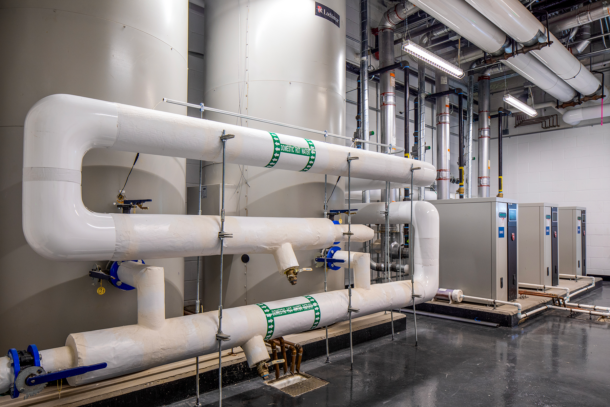
With a proven storage vessel like the Lock-Temp Round Jacketed Storage Tank,
making sure the stored hot water is ready for delivery is a given. These tanks
have the exclusive Lock-Temp baffle that keeps water evenly stratified and the
80% draw factor allows almost the entire capacity to be used at the designated
temperature.
With the help of local manufacturers’ rep firm, Harry Warren, the installing contractor, Touchton Plumbing out of Jacksonville reported that the whole experience went off without a hitch. “The installation went extremely well, and the units have been working without fail through the first year of the facility being in use,” said Parker Touchton, project manager. The equipment was installed and commissioned according to schedule and is said to be performing as promised—and at the end of a 12-hour practice, there’s no room for disappointment.
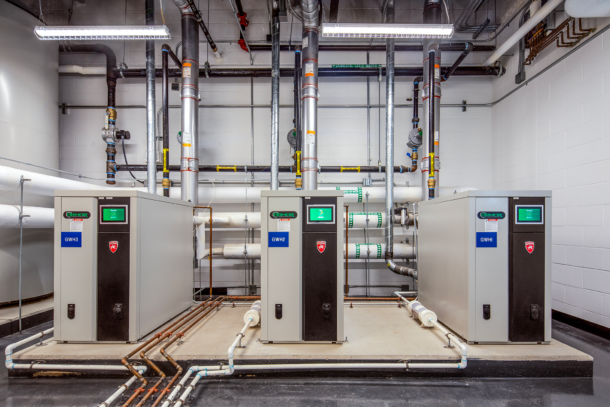
- Plumbing Contractor – Touchton Plumbing Jacksonville
- Manufacturers’ Rep – Harry Warren, Inc.
- Engineer – Henderson Engineering
- Architect – Rossetti
- GC – Haskell
- Jaguars Facility Manager – Geoff Deluca
To see more about the future at Lochinvar, click here.

Pfister® Faucets continues its celebrated docuseries, hosted by country music star and Army Reserve soldier Craig Morgan, spotlighting real-life stories of plumbers’ successes and the individual approaches that enabled them to achieve their dreams through a career in plumbing. Pfister® Faucets, a trailblazer in the plumbing industry, proudly announces the launch of the fifth season Read more

Pfister® Faucets continues its celebrated docuseries, hosted by country music star and Army Reserve soldier Craig Morgan, spotlighting real-life stories of plumbers’ successes and the individual approaches that enabled them to achieve their dreams through a career in plumbing.
Pfister® Faucets, a trailblazer in the plumbing industry, proudly announces the launch of the fifth season of their docuseries, American Plumber Stories. Over the past four seasons, this series has captivated audiences nationwide, showcasing the inspiring stories of plumbers who have overcome challenges to pursue their dreams in the plumbing trade.
Season 5 will present perspectives from plumbing experts in Australia, Alaska, Canada, Hawaii, and California, shedding light on the common challenges faced by plumbers worldwide. For the first time, the show has ventured outside the United States, creating great excitement about reaching an international audience—especially the next generation of plumbers.
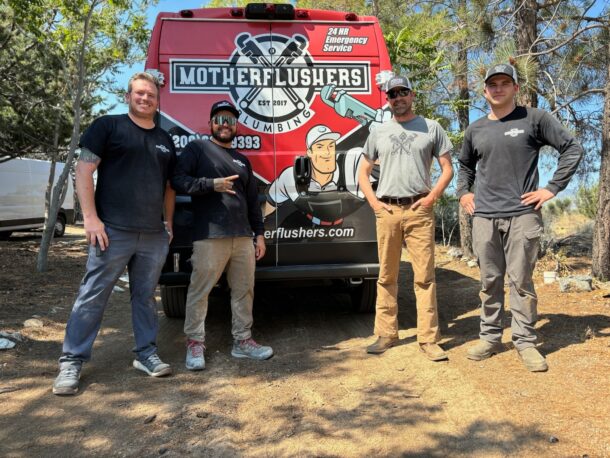
Craig Morgan Returns for Season 5
Country music star and Army Reserve soldier Craig Morgan will return as the show’s charismatic host. Craig’s authentic passion and profound connection to the stories of tradespeople make him the ideal guide on this journey of discovery and inspiration.
“This year, Pfister’s American Plumber Stories is heading to my second home state of Alaska and beyond, and five seasons in, it remains an honor to share these stories of inspiring men and women on the frontline of the worldwide plumbing trade,” Craig Morgan shared.
Strong Alliance Partners and New Partnerships
Three new partners joined forces with American Plumber Stories for Season 5. The International Code Council, NIBCO and AprilAire will help expand the reach of the series to their sizable audiences in the US and around the world. They are joining the ranks of industry leaders RIDGID, Cintas, Oatey, and the PHCC in this important mission.
“NIBCO partnering with American Plumber Stories was a natural fit, as we are committed to supporting and elevating the plumbing industry,” said Ashley Martin, president and COO, NIBCO. “The U.S. is in critical need of the next generation of plumbers. This show is helping to engage young men and women in an authentic way to help change the perception and inspire successful and fulfilling careers in the plumbing trades.”
Beyond the Boundaries
Season 5 tracks down some interesting plumbers around the world.
- Maui–Arecently retired plumber lost his house and everything he owned in the Lahaina fire disaster. The set-back motivates his son Raymond to recruit the next generation of plumbers to help build Lahaina back.
- Australia– Martin is the “Crocodile Dundee” of the plumbing industry in Tasmania. He specializes in servicing remote locations that he reaches by helicopter and small “bush” planes.
- Alaska– In this episode we explore the beauty of Alaska and what it’s like for Bill to work as a plumber in an extreme climate.
- Vancouver Island, B.C.– This episode tells the inspirational story of Mary Anne who employs an all-female team of plumbers. Her 100K+ social media followers know her as @the_ladyplumber. Discover why she is a role model to tradeswomen.
- Salinas, CA– Plumber Instructor Jorge helps rehabilitate inmates by teaching them the plumbing trade in the Soledad State Prison. We have an open discussion with the warden on why this approach works so well.
- Victorville, CA– Meet the Motherflushers. They are young and passionate about plumbing and have changed the perception via social media– well beyond the borders of the United States.
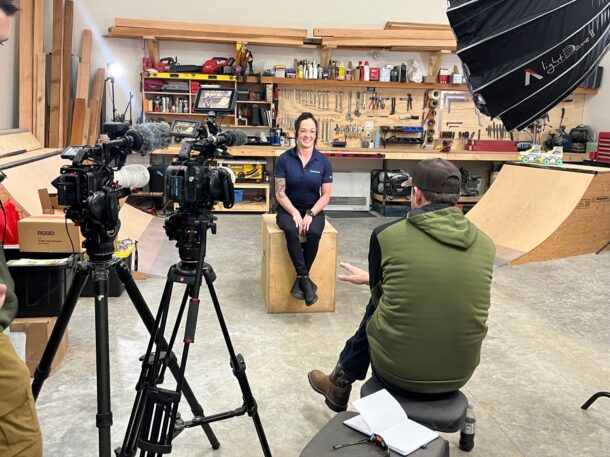
For more information and to watch the new episodes of American Plumber Stories, please visit www.americanplumberstories.com.
Interested plumbers who would like to share their own story can do so here: www.americanplumberstories.com/pages/i-am-an-american-plumber.
Stay Connected
YouTube.com/c/AmericanPlumberStories
Instagram.com/AmericanPlumberStories
Facebook.com/AmericanPlumberStories
Linkedin.com/showcase/American-Plumber-Stories
TikTok.com/@AmericanPlumberStories
Subscribe to Email and Text Message Alerts www.americanplumberstories.com/pages/subscribe

Partnership between Xylem, Chris Long Foundation’s Waterboys initiative and Water Well Trust brings clean water access to Goldston family Jessica Sales and her three children in Goldston, North Carolina, will have secure access to safe and reliable water next week, thanks to a recent collaborative effort. Xylem Inc., the Water Well Trust (WWT) and Waterboys Read more
Partnership between Xylem, Chris Long Foundation’s Waterboys initiative and Water Well Trust brings clean water access to Goldston family
Jessica Sales and her three children in Goldston, North Carolina, will have secure access to safe and reliable water next week, thanks to a recent collaborative effort. Xylem Inc., the Water Well Trust (WWT) and Waterboys – a charity initiative founded by two-time Super Bowl Champion, Chris Long – provided a comprehensive upgrade with all necessary equipment and installation for drilling a new well and building a pump house. Additionally, project partners contributed by installing a front door screen, placing pavers and planting flowers and shrubs. Local distributor Hughes Supply Pinehurst, well driller W.W. Maness & Sons Inc Well Drilling, pump installer Clearwater Solutions and the Vinyl Institute, which donated PVC piping material, all donated their time and services to complete the project.
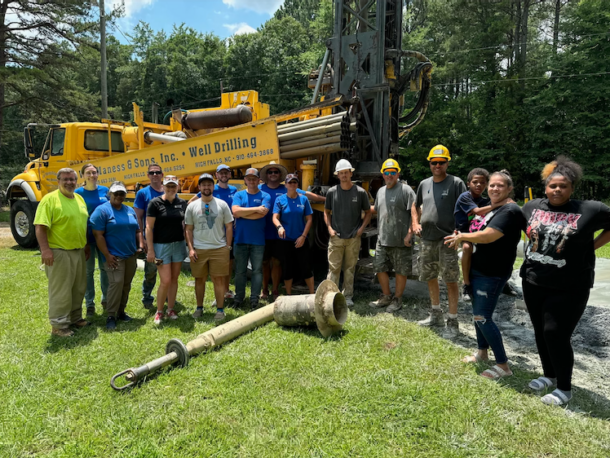
“Being involved in this project to provide the Sales family with reliable water access is incredibly meaningful for us. As a family business that’s been around since 1950, we take great pride in giving back to our community,” said Chris Maness, W.W. Maness & Sons Inc Well Drilling. “This project highlights the importance of ensuring that everyone has access to clean water, especially in areas where it can be difficult to find. We’re dedicated to using our expertise to make a positive impact. Having our entire team on-site ensures that we can get the job done right to support this family in need.”
Sales is a certified nursing assistant working at two hospitals and single mother of three. Prior to the well upgrades, she experienced a severe water shortage due to the failure of their home’s 38-year-old well, drilled in 1986. Despite multiple repairs, the well continued to run dry every morning since Sales first purchased the property in 2021. As a result, the family, including Devan (17), Asia (14) and Jayviann (6), struggled to meet their daily needs with only 30 jugs of water on hand, insufficient for basic hygiene and laundry. This crisis was especially challenging as one of Sales’ children has epilepsy, requiring consistent care, and making their life increasingly difficult without a reliable water source.
“After being in the house for a month or so, I started having issues with the water going out and the well running dry. My family and I have been struggling, sometimes having water and other times going weeks without it. We’ve had to rely on friends and family for basic needs like showering, laundry and washing dishes,” said Sales, WWT beneficiary. “The support from the Chris Long Foundation and partners is a tremendous blessing that has lifted a huge burden off our shoulders. We are incredibly grateful.”
The Sales family’s well upgrade marks the 17th HometownH2O project, an extension of its domestic water initiative working alongside WWT and Xylem to provide clean, sustainable water to communities in need. Water scarcity issues currently leave more than 2.2 million Americans without access to clean water, making this joint effort between Long, his Foundation’s Waterboys initiative and Xylem a vital resource for families across the country.
“Being on-site and witnessing the transformation that clean water access brings to the Sales family is truly inspiring. At Xylem, our mission is to solve water challenges and partnering with the Water Well Trust and the Chris Long Foundation’s Waterboys initiative enables us to do just that,” said Susan O’Grady, senior director of marketing, building services and agriculture, Xylem. “Seeing the relief and gratitude of the Sales family reinforces the importance of our work and motivates us to continue bringing sustainable water solutions to those in need.”
“Access to safe drinking water is a fundamental right that no family should have to go without. Our collaboration with Xylem, Water Well Trust and other partners on this project has been incredibly rewarding,” said Chris Long, founder of the Chris Long Foundation. “Seeing the positive impact it has on the Sales family reinforces our commitment to bringing lasting water solutions to those in need. Through our HometownH2O program, we are changing lives here at home, one well at a time.”
Xylem, in conjunction with its Goulds Water Technology brand, is engaged in regular water well initiatives to provide secure water access to rural areas, striving to increase public awareness of the challenges surrounding lack of water access. For more information about the Chris Long Foundation’s HometownH2O projects, visit waterboys.org/hometown.

Service Experts is proud to announce their partnership with Military Makeover with Montel® on Lifetime TV. Military Makeover, a home improvement series, celebrates military families through home makeovers across the country. “We are grateful to play a small part in the meaningful work being completed by the Military Makeover team,” said Service Experts Chief Operating Read more
Service Experts is proud to announce their partnership with Military Makeover with Montel® on Lifetime TV. Military Makeover, a home improvement series, celebrates military families through home makeovers across the country.
“We are grateful to play a small part in the meaningful work being completed by the Military Makeover team,” said Service Experts Chief Operating Officer Cary Reed. “Many of our Service Experts employees are veterans themselves, and we are committed to supporting the military community through our ongoing partnerships with programs like Hiring Our Heroes. Being a part of the Military Makeover mission gives us another way to serve this community.”

Military Makeover is led by talk show legend and military advocate Montel Williams, a veteran of both the Military Makeover with Montel. The show enlists conscientious designers, contractors, landscapers and other home improvement professionals to transform the homes and lives of military families across the country.
“We are thankful for the partnership of Service Experts and look forward to working with them to provide comfortable and safe homes,” said EVP of Programming, Jack Schwartz. “Their wide array of offerings will allow us to make these deserving families feel right at home.”
“For our part in the makeovers, we will be providing the families with anything they need to transform their home into a haven of comfort, well-being and energy efficiency,” said Reed. Service Experts, which has over with 98 locations across the country, is the leading provider of total home comfort in the U.S. HVAC installation and repair, plumbing, connected home automations and solar energy solutions are just a few of the services the company provides. “Our team will address each family’s individual needs to determine how we can help transform their home,” said Reed. “We look forward to giving this gift of total home comfort to these deserving families.”
Military Makeover with Montel® will premiere later this year on Lifetime TV.
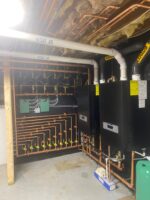
By Thomas Renner Any couple will tell you an enduring relationship depends on effective communication. So, too, do some home heating systems. Jeff Potvin came across this scenario in a project at a six-bedroom, 6-bath house in Andover, Mass. Potvin, the owner of Jeff Potvin Plumbing & Heating in Methuen, replaced two 150k BTU boilers Read more
By Thomas Renner
Any couple will tell you an enduring relationship depends on effective communication. So, too, do some home heating systems.
Jeff Potvin came across this scenario in a project at a six-bedroom, 6-bath house in Andover, Mass. Potvin, the owner of Jeff Potvin Plumbing & Heating in Methuen, replaced two 150k BTU boilers and a 75-gallon natural gas water heater. He chose two HTP Elite Ultra high efficiency condensing boilers as the alternative.
“The two new boilers will communicate with each other and increase efficiency, which will save the homeowner on his heating bill,’’ Potvin said.
No Ordinary Home
The residence where Potvin installed the boilers is no ordinary home. Built in 1954, the home is located in one of the state’s most historic towns just 20 miles north of Boston. The structure sits on 1.4 acres and extends across more than 7,800 square feet, including a sunroom, multiple fireplaces and is a mile away from Phillips Academy, a prestigious private high school. The school’s graduates include 2 former Presidents, George H.W. Bush and George W. Bush, Humphrey Bogart, Jack Lemmon and Bill Belichick, among others.
The challenge Potvin faced in the project was establishing communication between an outdoor sensor and the aquastat that were on air handlers to help reach the correct temperature. Aquastats are used in hydronic systems and adjust the temperature of the water in the boiler based on the outdoor temperature.
“We needed to move a few dip switches on the board to get it to work properly,’’ Potvin said.

The setup will increase efficiency and save the homeowner money on monthly heating bills. It will also heat domestic hot water and keep the home at a better temperature.
Project scope
The units provide hot water and heat for the home. Potvin said it is unusual, however, to replace three heating elements and get the same firepower with just two.
“It is unusual to change a water heater to a storage tank,’’ he said. “We completed the job during the summer, so no heat was needed.”
But the homeowner should realize some important benefits, according to Potvin.
“The two new boilers communicate with each other and increase efficiency,’’ Potvin said. “That will save the homeowner with the heating bill. The boilers have a larger BTU and will heat up faster and more efficiently. It will heat domestic hot water and keep the home at a better temperature.”
An Elite Solution
Potvin chose the HTP Elite Ultra boilers for other projects and knew it would be a good fit for this application.
The calling card for the Elite Ultra is a proprietary heat exchanger. The XtraTech Durable Stainless Steel Heating Technology exchanger ensures maximum quality at the heart of the boiler and resists corrosion to guarantee reliability for years.
The design provides increase in water flow, which creates more internal turbulence, scrubs the internal walls and reduces heat exchanger deposits to ensure a longer life span for the boiler.
Deposit buildup is a major problem in boiler operation. Scale and sludge deposits in boilers impede heat transfer, which leads to higher energy costs and can cause a loss of equipment operation and premature failure.
Boiler deposits can include calcium, magnesium, iron, copper, aluminum and others. Water treatment options can help reduce scale buildup, but those annual expenses can reach between $1,000-$2,000. Annual maintenance on the boiler will also help, but service calls can also reach more than $600.
The pipe surface on the Elite Ultra is up to 150 percent larger than conventional designs and ensures extremely low pressure water pressure drop. “The heat exchanger guards against corrosion and guarantees a long lifetime for the boiler with less maintenance,’’ Potvin said.
The boiler has a 10:1 turndown ratio that limits short cycling and provides more efficient energy consumption. The boilers rated thermal efficiency is among the highest in the industry at 96%. Adding the outdoor sensor provides the opportunity to increase that efficiency by reducing the delivered water temperatures to match the load based on outdoor temperature. This feature allows homeowners to save even more money on their monthly energy bills.

Two HTP Elite Ultra high efficiency boilers were installed in a Massachusetts home by Jeff Potvin Plumbing & Heating. The boilers replaced two 150K BTU boilers and a 75-gallon natural gas water heater.
Additional Advantages
The boiler also offers whisper-quite operation and an HTP Link that lets the homeowner control boiler operation from anywhere. With the link, homeowners can view boiler parameters and status, receive boiler text and e-mail updates, and access the unit and troubleshoot issues without having to be onsite, as long as the unit is connected to Wi-Fi and registered.
“We have used these HTP products in the past found it to be a great product,’’ Potvin said. “We also found tech support to be very good.”
Home and hot water heating can be especially challenging in Massachusetts, where temperatures fluctuate wildly from season to season, and sometimes daily during transitional periods. Having an efficient system on a large residence will generate considerable savings for the homeowner.
“Projects such as this can be challenging to find the proper solution,’’ Potvin said. “We think the homeowner will be quite satisfied with this product for years to come.”
Thomas Renner writes on building, construction, engineering and other trade industry topics for publications throughout the United States and Canada.
